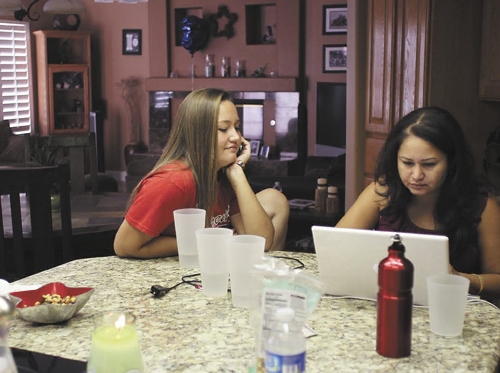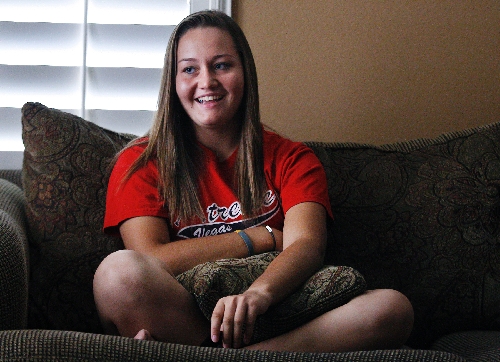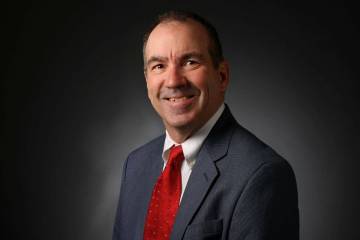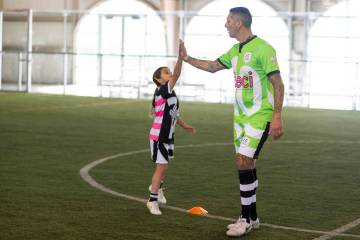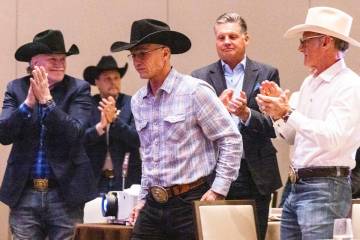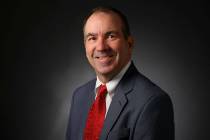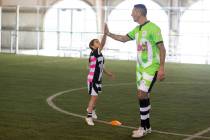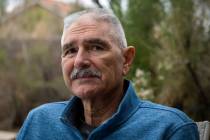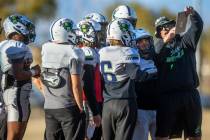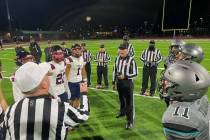In a fight for her life, she’s still all smiles
The symptoms -- breathing difficulties, headaches, vomiting, fatigue -- had only been intermittent, but they had persisted for a year or more. And so tests were ordered. And so when Massiel Merritt and her 15-year-old daughter, Kassidy, a reserve catcher for the Centennial High softball team, were sitting in the waiting room with the other patients, there was anxiety and perhaps a bit of trepidation not spoken for.
And then the radiologist came into the waiting room, and he was holding the X-rays and whatnot, and he was saying that Kassidy and her mother needed to see the doctor -- and they needed to see him now -- and that they should use the back stairwell.
"That's when I knew," Massiel Merritt said.
It's never good news when they tell you to use the back stairwell.
Kassidy Merritt had a brain tumor. That's what the doctors said, but did they have to be so blunt about it?
Later that night, there was a blinking cursor on a computer screen. Her world having been turned upside down, Massiel Merritt made a notation of the date, and began to type.
■ MAY 19: The oncologist proceeded to tell us that he felt Kassidy should be hospitalized immediately and surgery would be done the next day. Our world came crashing down. Thank goodness I had asked Ryan to come along, 'cause I don't think Kass and I would have been able to hear all that by ourselves. Needless to say I was a mess, and will you guess who drove me home? Kassidy! She composed herself before we got home, not knowing if we wanted to tell Kyle, because he had to run the next day at state. She packed her things, and we left for the hospital.
These are nice people, the Merritts. Friendly. Warm. Hospitable. Like the Cleavers, only without the cardigan sweater and pearl necklace.
Ryan Merritt, who grew up in Wyoming, is an assistant principal at Oran Gragson Elementary School. Massiel Merritt, who grew up in Panama, is a real estate agent, or at least was until her daughter got sick. Kyle Merritt was a track star at Centennial who graduated last week and will run the 800 meters for Boise State beginning in the fall.
Kassidy Merritt is a pretty girl, a junior-to-be in high school who also plays classical violin, guitar and piano. And tennis and bowling, in addition to softball. She gets straight A's (or at least did until her head started pounding) and also cares for a pet ball of fluff, a gray rabbit named Lala.
On the wall in her bedroom, next to her bed, are surfing posters. "Endless Summer," one says. No, she doesn't surf. She just thinks that poster looks cool.
The rest of her room looks like a wave from the Banzai Pipeline hit it. She's 15, so that's to be expected, one supposes.
It's the brain cancer that nobody expects. Nobody ever does. Nothing can prepare you for something like that. And yet, if one were standing amid the dirty clothes and the DVD cases strewn about and the musical instruments and the other trappings of youth and vitality -- the reminders of summers that promise not to end -- one would feel the good vibrations.
Maybe it's those surfing posters on the wall. Maybe it's the way that 15-year-old Kassidy Merritt, about to embark on the fight of her young life, smiles at everything you say as if she hasn't a care in the world.
■ MAY 20: Our biggest worry is that the tumor is extremely close to the brain stem. The neurosurgeon explained to us the risks, and they were so great. The brain stem controls everything, like breathing, swallowing, walking, etc. Any of these senses could be severed or damaged with any cut near or on the brain stem.
There will be no cutting near or on Kassidy Merritt's brain stem because doctors at Mayo Clinic and Johns Hopkins and any number of other centers where medicine is practiced, and practiced well, agree that surgery is much too risky.
The tumor is diffused, infiltrated, wrapped around Kassidy's brain stem like a steel vine.
It is inoperable.
That's another word a parent never wants to hear.
■ JUNE 5: Friday was a day we all had been waiting for. Not exactly the news we wanted to hear. Brain stem gangliogliomas are very rare, a reason why not just any cancer hospital in the country will be able to help us. We have actually felt a calm, since we now know what we are dealing with. But deep in our hearts we are a little scared of the future.
Brain stem gangliogliomas are low-grade tumors that usually have a long clinical history.
They also cause sudden death.
The fear the Merritts are feeling deep in their hearts isn't unfounded. But they don't talk about it much. It's as if Kassidy is a pitcher working on a no-hitter, and her mom and dad and brother are her teammates, not wanting to tempt fate.
On many days, Kassidy feels fine. On others, she vomits, and has those headaches. Sometimes they are severe.
Her mother spends almost all of her free time on the computer, reaching out to parents of other brain stem ganglioglioma patients, hoping they will provide her with hope.
Sometimes they do.
But only sometimes.
■ JUNE 8: Today was a bit of an emotional day. I was able to talk to two more parents with children with brain stem ganglioglioma. Sadly, one of the parents lost their boy in April of this year; little Matthew had complications with pneumonia, which is a side effect from treatments. Matthew was 12. His story broke my heart.
On Friday, I spent two hours in the living room of the Merritts' ranch-style home in the northwest part of town, getting to know them a little bit, getting to know a lot about what Kassidy is up against. Doom and gloom were conspicuously absent.
Kassidy was asked about her initial reaction upon learning her tumor was malignant and inoperable. It wasn't "Woe is me." It was woe for her letterman's jacket, and the blank chenille bars stitched under the names of her sports, to be filled in after she earns subsequent letters in them. If she's sick, how is she going to bowl a 160, or throw out would-be base stealers, or play her dad's Stradivarius, the violin he handed down to her when she was in sixth grade?
"It was just hard for me to realize what was happening," she says, smiling, always smiling, while sitting on a sofa next to her brother.
On the good days, when it's hard to tell she's sick, she doesn't spend so much time thinking about what she's going to write in the journal she now keeps.
On Thursday, she even went out and tossed the softball around with her club team. You should have seen her smile that day, her parents said, fully aware that cancer patients who undergo radiation treatment do not generally smile, fully aware that cancer patients who undergo chemotherapy do not generally feel fit enough to toss the softball around.
■ JUNE 13: A little ray of hope today. In our never-ending search of treatments we have found the Burzynski Clinic in Houston. This clinic performs a therapy that uses human DNA found in the blood and urine that can be used to control cancer growth. On their site I found a story of a patient named Jessica Ressel, who was 11 years old when she was diagnosed with a diffused intrinsic brain stem glioma, and after a year of therapy, her tumor was gone. She has been in remission since then, and she is now 24 years old, married, with two children.
Hope.
And then the next day, Kassidy threw up her breakfast again.
■ JUNE 14: These are the times when we feel helpless, and the tumor slaps us in the face. Cancer sucks! There, I said it.
Despair.
And then two days later, Massiel Merritt heard from Jessica Ressel's doctors.
Cancer still sucked, but at least there was another option to consider, an option that wouldn't make Kassidy's long brown hair fall out and sap her energy and trigger any of the harmful side effects the parents of the other kids warned about; side effects, that, in some cases, wound up taking them before the cancer could.
Massiel Merritt was optimistic this experimental treatment in Houston might stabilize the tumor, cause it to enter remission, provide her daughter with quality of life.
Ryan Merritt agreed. It costs $30,000 just to get started, but money is no object in times like these. This was definitely something to consider, whatever the cost.
Kassidy's doctors did not think it was something to consider, even if it cost nothing.
They said the Merritts were taking their daughter to Texas to see a "quack."
■ JUNE 22: Unfortunately, most of these (experts) do not approve of the course of treatment we have chosen for Kassidy, because it's not FDA approved. Most of them will not even look at us because of that. The Ronald McDonald house in Houston won't even let us stay there. Our oncologist does not even want us to refer the Burzynski Clinic to our insurance company. Not one doctor is behind us. So frustrating! Ryan went to deposit a couple of checks we had received for Kassidy and ... since we are not a nonprofit organization, they would not let us deposit them. Everywhere we turn, we're hitting a brick wall.
That was the day that Kassidy, in preparation for this interview, was taking a shower and felt something crack inside her skull.
It scared her mother half to death. Kass couldn't move her head without feeling searing pain, and Massiel's heart began to flutter. The doctors were in surgery that day, they couldn't see Kassidy. So a desperate Massiel Merritt turned to a higher authority.
"All I could do was ask God to please help us," she said.
Two days later, the Merritts were on their way to Houston.
They drove, because they don't know how long they will be staying. Or even where they will be staying, other than it won't be the Ronald McDonald House.
Kassidy's first appointment at the Burzynski Clinic was Tuesday.
Massiel Merritt asks only that you keep her daughter in your thoughts and prayers, and that you never be told to use the back stairwell at a doctor's office.
Las Vegas Review-Journal columnist Ron Kantowski can be reached at rkantowski@reviewjournal.com or 702-383-0352. Follow him on Twitter: @ronkantowski.
HOW PEOPLE CAN HELP
Persons wishing to make a contribution to help defray Kassidy Merritt's medical bills can visit the "Kassidy's Road to Recovery" website at kassidysroadto recovery.blogspot.com and click on the "donate" button.
An account -- Kassidy Merritt Donation, account No. 1815135494 -- also has been set up at Wells Fargo Bank. Checks should be made out to the Kassidy Merritt Donation.
"Kassidy's Army" T-shirts will be sold ($15 for one, $10 each for two or more) at the fireworks stand at the One Stop convenience store, 7591 N. Cimmaron Road, through the Fourth of July or by calling coach Curt Spencer (622-5801). Livestrong bracelets in Kassidy's name also are available for $5 at the fireworks stand.
Kassidy also will be the face of the Las Vegas Cancer Foundation's Livestrong bicycle ride on Oct. 1. Click here to make a donation in her name.
LAS VEGAS REVIEW-JOURNAL



